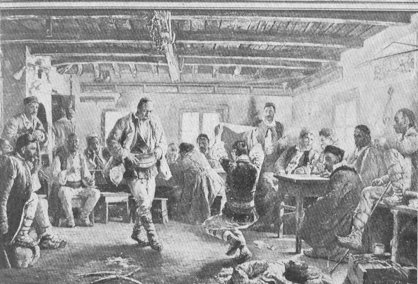
In a village saloon, after a painting by Ivan Murkvitchka
CHAPTER V
Making a Living
A.
What distinguishes the Bulgarian amalgam, in which many racial, social and political elements have been fused by the fires of terrific and unceasing conflicts, is a peasant character and a peasant psychology. To be sure, not all that went into the seething melting pot was of a peasant nature but practically all that has come out of it is. The Thracians who at the time of Christ occupied the territory that is now Bulgaria were peasants, settled in villages, attached to the soil and given to productive, peaceful pursuits. The influence which the Romans left upon the people of the eastern part of the Balkan Peninsula was also preeminently that which aids agriculture. In many parts of the land were Roman camps or garrisons. But these were not merely military organizations; they were colonies as well. The Roman soldiers remained in the vicinities where they served, received lands, married native women and formed agricultural communities. Furthermore, they and their superiors and the state which they represented imposed laws and accustomed the people to order. All this fostered agriculture and aided in the creation of a peasantry.
The Slavic tribes also which later pierced into the eastern part of the Balkan Peninsula were essentially tillers of the soil. They blended with the native inhabitants and strengthened the peasant strain. The Bulgarian conquerors who came after them were warriors and bold adventurers with a passion for domination and power, but they were completely swallowed up by the Slav peasants. The tillers of the soil, preserves of order, makers of law, singers of songs, weavers of pretty costumes and builders of homes triumphed.

In a village saloon, after a painting by Ivan Murkvitchka
Then came two other powerful invasions, which held sway over the peninsula with intermissions for nearly a millennium. They were of the Turks and Byzantine Greeks. The predominant characteristics of the Turks who occupied Bulgaria were not those which distinguish tillers of the soil. The invaders were warriors, plunderers, rulers, feudal lords; they sought pleasure, ostentation, grand gestures, romantic adventures; they were given to caprice, injustice, disorder, tyranny. Such traits and tendencies are of course incompatible with flourishing agriculture and indeed the Turks ruined agriculture, but they did not ruin the Bulgarians as agriculturists. In fact they intensified the attachment of that people to farming. They practically restricted the Bulgarians to that occupation along with stock-raising and home industry. Not only were these things all that was left for the Bulgarians to do but the Turks were glad to have the Bulgarians do them. The Turk was a "bey" or a "pasha", a lord. He had power and lands. And the Bulgarian, the despised Christian, who could be neither a soldier nor judge nor ruler worked the lands for him. So in a double fashion the Bulgarians managed to survive, the poorer and less aggressive in the plains and valleys as tillers of Turkish fields and the more vigorous and spirited in the mountains as tillers of their own small fields and as stock raisers. However, in neither case were they nomads. The Bulgarians are settled, home-loving people. As the years passed, being prolific, industrious and economic, they gradually descended from the mountains and acquired land of their own in the plains and valleys where the soil was good, step by step spreading over a large part of the whole peninsula.
Strange to say Byzantine domination operated in much the same way. These orientalized Greeks were anything but peasants. They, in fact, quite despised such simple and dull beings as tillers of the soil and pedlars of sheep's milk. They disdained the language, customs and smell of clodhoppers. They were merchants, priests, rulers, administrators and money lenders. They lived in beautiful houses, maintained large establishments, dressed in delicate clothes, lavishly entertained, were learned in many arts, imposed a rigid social hierarchy and enjoyed being the leading people in the country, living mostly in the larger cities and busier ports. Inasmuch as they completely dominated the cultural and religious life of Bulgaria for centuries one might suppose that they would have left a distinct Byzantine mark on the nation, especially in view of the fact that they had great assimilating power. They exercised an attraction which it was not easy to resist. And with such people conducting the churches, playing the leading role in the economic life, monopolizing culture and even taking a prominent part in the state administration, for long periods at a time actually ruling the land, how was it possible for them not to attract the Bulgarian people away from exclusively peasant pursuits! The answer is, that many Bulgarians did indeed become cultured but by that very process they ceased to be Bulgarians and became Greeks. The cream or perhaps the scum was certainly skimmed off the Bulgarian nation. Many Bulgarian merchants and the leading people of various professions accepted Byzantine characteristics, but in consequence they were rejected by the mass of the people. They in fact ceased to consider themselves Bulgarians. They were proud of having become Greeks. They moved up in the world and scorned their humble origin. Those who remained peasants were Bulgarians. The two terms became practically synonymous. The Bulgarians were squeezed into the peasant mold. It was almost exclusively these tillers of the soil, wielders of the hoe and milkers of sheep who preserved through the centuries the Bulgarian race. ’Twas these hardheaded, tight fisted, silent, conservative men and women, dressing in animal's hides and in garments spun from animals' hair, living among cattle and sheep and loving their soil with a religious passion, stubbornly resisting foreign influence, glorying in their provincialism and refusing to let their children imitate their "highfalutin" city cousins — 'twas these who preserved their nation until, after decades of saving ignorance, a monk finally raised his trumpet and besought his people not to be ashamed to be Bulgarians and not to pretend that they were Greeks.
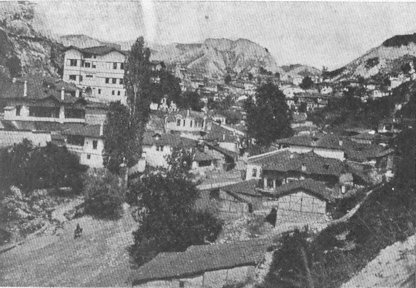
Melnik, the most picturesque city in the part of Macedonia
that fell to Bulgaria
Thus, by a most remarkable historical conspiracy, practically every influence that has operated in the Balkan Peninsula for two millenniums has helped make the Bulgarians a distinctly peasant nation. And although there are millions of intelligent people in the world who are inclined to smile condescendingly at country cousins, I consider that these peasant qualities of the Bulgarians are their best hopes for the future. Peasants love peace, established order, rigid rules. They live by laws, emphasize square dealing, favor cooperative activity. They are industrious, thrifty, saving. Since they create rather than plunder, they protect property and established rights. They build up, make roads, erect houses, introduce improvements, take pride in achievement and possession, insist on moderate though steady progress. They enjoy games, songs, social gatherings, decorations and so foster the arts. They want recognized rules, established methods, printed regulations and instructions, so they favor books. They collect their songs and stories and enjoy literature. They continually need tools and utensils so beside peasants one always finds artisans. They must buy and sell so they create a small frugal merchant class. They need some one to enforce the many rules of farming, using water and land, buying and selling, so they create governments and settled states. They are the basis of civilization and culture and the .staunchest defenders of religion. They are solid, firm, conservative, creative and reliable.
So the fact that according to official statistics 79 % of the people in Bulgaria live in villages inspires hope in the future of the country. 81.3 % of the people make their living through agriculture and a large part of the remaining 15 % who live in small towns that are not much different from villages are also engaged to a certain extent in agricultural pursuits.
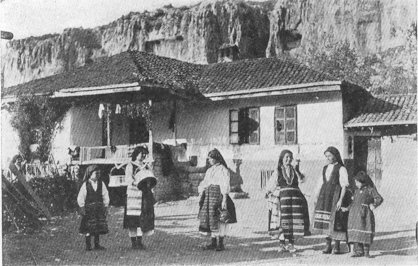
In the village womens' hands are never idle
The 9,700,000 acres of arable land in Bulgaria belong almost entirely to the people who work them. Most of the fields are small. Approximately three fourths of all the holdings in the country contain less than eighteen acres each. More than half of the landowners possess less than 13 acres each. These small holdings, belonging to half of the agriculturists in Bulgaria, constitute about a fourth of the workable land. Approximately a tenth of the holdings comprising a fifth of the agricultural land, contain from 25 to 38 acres each. Only 11 % of the land in Bul-aria is divided into holdings of 75 acres or more. In the whole of Bulgaria there are less than 4,500 families who own as much as half of an American quarter section. The average amount of workable property owned by an agricultural family is 13 acres. The total number of agricultural holdings in the country is 734,191 containing 14 million pieces of land while the number of peasant families is 800,000, which may be interpreted to signify that most of the families living in the villages own land. It is estimated that the total number of absolutely landless village families is about 100,000 or approximately a ninth of all in the country. The important thing shown by these dry statistics is that the arable land in Bulgaria is very evenly distributed. There are no grand estates whatsoever. There is no privileged landed class. There are not many people who own land without working it nor are there so very many who work land without owning it. Of course there is a fairly large number of villagers who do not possess enough land to keep them and they work for the richer peasants.
This just distribution of the land is due to several causes. In the first place, all of the aristocrats and lords in Bulgaria during the ages of oppression were foreigners, Turks and Greeks, so the Bulgarians had to satisfy themselves with small fields, usually in more or less obscure, rather unfertile districts. In the second place, after the war of Liberation the large estates owned by the Turks were distributed among Bulgarian peasants, who had already worked them for many years. In fact, by their thrift and enterprise a great many Bulgarian peasants even before their liberation had managed to buy much land from the Turkish landlords, who were not able to find servants to tend all their fields. Two other explanations must also be mentioned; first the Bulgarians have a religious attachment to the soil, looking upon land as they do upon bread, as something almost sacred, and they are very loathe to part with it even in the direst need. Secondly, the inheritance laws of the country provide for the distribution of real estate among all the children, so that in the course of time the land has been very much divided.
This system of landholding has, of course, several indisputable advantages. One is that it makes for stability, encourages thrift, fosters a sense of pride and ambition in the peasants and is conducive to democratic sentiments. Inasmuch as the Bulgarian peasants work for themselves, they are inclined to, work with all their might and since they are independent, they acquire the habit of taking an interest in social and political affairs. This is undoubtedly a solid basis for a stable and prosperous state.
However, there are also defects. In the first place, the lack of rich, enlightened, enterprising landlords farming on a large scale, has tended to delay the introduction of modern agricultural methods. It is aristocratic owners of large estates traveling abroad, studying farms in other countries and having capital at their disposal, who usually buy the latest machinery, experiment with new kinds of animals and seeds and introduce better methods. The peasants living about these large model farms also advance.
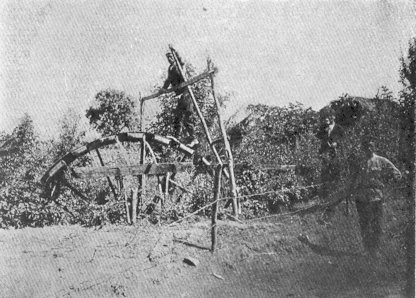
A primitive irrigation wheel for watering gardens. It
is propelled by man power somewhat like a treadmill. Others are driven
by horses and some by streams, when such are available
The absence of such people in Bulgaria has left agriculture there on a dead level. In addition, the individual peasants are so poor that they are not able to buy new machines nor new animals. And finally, the fields in Bulgaria are so very small and so scattered that in many places large machines such as tractors cannot be used. When one bears in mind that the average holding of actually cultivated land contains only ten acres and that half of them are less than 13 acres in extent, and furthermore, that this small holding may consist of a dozen scattered fields — they average 17 — he sees how complicated the problem of cultivation is. The people live in villages and depart early each morning to fields which lie one against the other and may be situated five miles from the owners' homes. And the same man may have fields lying in all four corners of the village domain. So how could he use a tractor on a number of half acre fields lying miles one from another and jammed in among scores of other tiny fields? Agriculture carried on under such conditions requires special methods and certain special reforms. The Bulgarian governments since the liberation of the country, half a century ago, have devoted much attention to this matter and the success they have attained constitutes one of the most glorious pages in Bulgarian history. Not merely the turning of swords into plowshares but the putting of iron plows behind the shares is one of Bulgaria's greatest triumphs.
The Bulgarians are not only owners of land but also builders of houses and the houses they build are their own. Since the war there has been quite a building boom. Many of the new structures are found in the villages as well as in the cities and most of them are homes. The Bulgarians have never been housed so well as at present, in spite of all the disastrous wars; they are one of the few peoples in southeast Europe with no dwelling crisis.
No other country in Europe has so many sheep and goats as Bulgaria; 10,000,000 in all, they are surpassed only by the number of chickens and other fowls. The presence of so many sheep indicates a somewhat backward form of agriculture; little by little they will be replaced by more productive animals and the land they graze on put to better use. But such a change cannot be made without difficulties and without a protracted struggle, because sheep owners have their rights, protected by recognized customs centuries old, while peasants in general are averse to sudden changes and "new fangled" ways. Nevertheless, inducing the villagers to improve their methods and elevating peasant life in its entirety has been one of the chief cares of the Bulgarian leaders during recent decades. And their efforts have not been in vain.
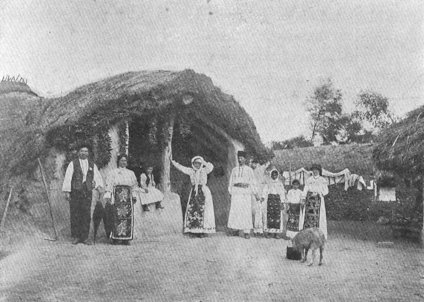
The kind of houses the Bulgarian villagers used to live
in
One of their notable improvements has been the making over of village habitations. Not so many years ago the peasants lived in the same buildings with their animals. Sometimes they were on different stories, but very often they dwelt together in the same long, low, gloomy hut. This simple dwelling was built in the ground like a shallow cellar, was largely without windows, utterly without ventilation and was covered with a thatched roof. In one end was an open fireplace where the soups and stews were cooked in kettles hanging over the fire and in which bread was baked under large inverted copper pans covered with hot ashes or coals. In the middle of the hut stood the cattle and buffalo, while in the further end was a slightly raised platform which at night was covered with mats and served as the family bed. There was no stove and its absence was not felt because the farm animals in a small, hermetically closed hut served as a central heating plant. There was practically no furniture. Men and women, children and adults, sick and well, lived very closely together. Under such circumstances anything but the most primitive and squalid life was impossible. But now that type of living has been absolutely transformed. Such dwellings remain only as a curiosity and some of the houses which have replaced them are substantial, brick buildings made according to modern plans furnished by the state. Furniture also is being introduced more and more into the village houses and in not a few places now many of the peasant homes are supplied with beds. Tables also are found in most dwellings, the wooden spoons are being supplanted with some metal cutlery and the common bowl ever more and more frequently has to share the table with individual plates. Probably the day will soon come even when the bones and unswallowed watermelon seeds are no longer thrown on the floor. This putting the animals in separate buildings, many of which are made according to state models, and the lifting of the people off of the ground up into good houses with windows that can be opened, and off a dirt floor onto chairs and beds is a reform, which means the elevation of the nation both mentally and spiritually. This springing up in many villages of strong houses, containing several rooms and covered with substantial tile roofs denotes a nation mounting upward.
There is also being effected a notable improvement in the methods of supplying the villages with light and water. Not so very long ago the gloomy village houses had no illumination but the fitful flames of a homemade candle or a flickering wick floating in oil. Then came simple tin lamps without chimneys which produced as much smoke as light, then small glass lamps and now electricity. Already hundreds of villages have been connected with the electric lighting plants that are springing up in Bulgaria illuminating both the houses and streets, while water from mountain reservoirs is brought down in abundance replacing the wells or open streams or distant springs, which until now have supplied the villagers with water. During the last decade, due to obligatory labor and to the increase of cooperative funds, the network of water pipes and electric wires spreading over Bulgaria has grown with great rapidity.
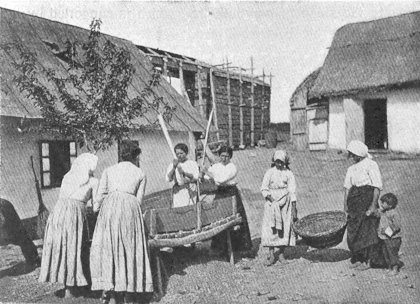
Shelling corn
Village schools, usually large and airy and often rivaling the best
to be found in western countries are doing away with peasant illiteracy
while thousands of new communal reading rooms are helping to introduce
the elements of higher culture.
[Previous] [Next]
[Back to Index]